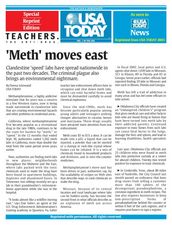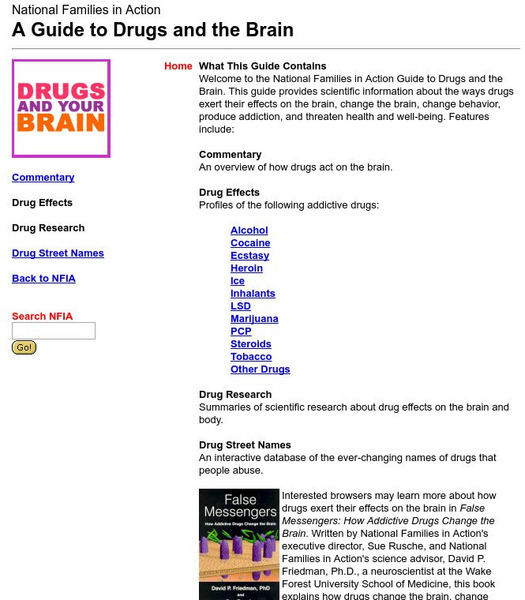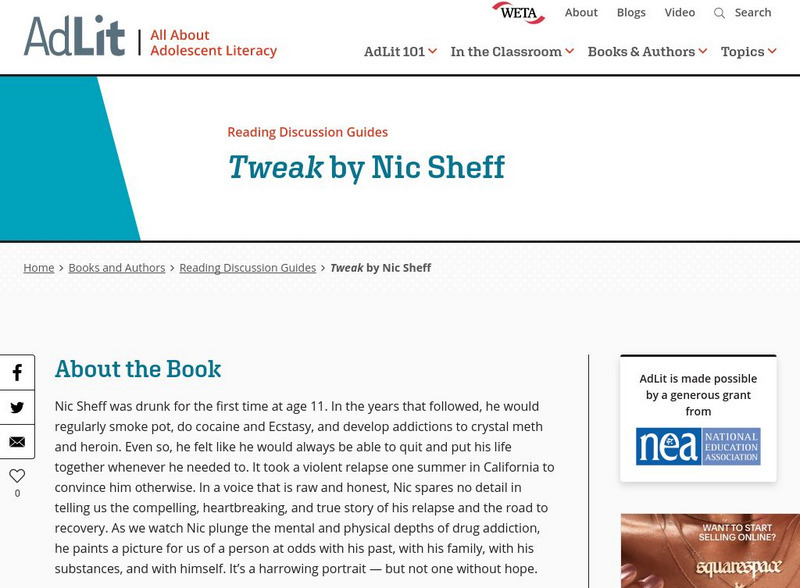Curated OER
Cocaine in the Brain
Students examine the effects of cocaine and heroin and withdrawal symptoms. In this drug lesson students participate in an activity that illustrates cocaine's actions.
Curated OER
Substance Abuse
Middle schoolers describe the effects of drugs on the human body, both short-and long-term consequences. They create personal approaches to substance abuse control and prevention. Students demonstrate effective practices in working...
Curated OER
What Do Drugs Do to the Body?
Students research the effects that drugs have on the human body. Using this information, they create a poster showing some of the effects of a specific drug. They work together to summarize the information they have gathered and present...
PBS
Stories of Painkiller Addiction: Myth or Fact
Are opioids the most abused drug after marijuana? How hard is it for young people to obtain painkillers without a prescription? Middle and high schoolers explore the growing epidemic of opioid addiction with a lesson that prompts them to...
Curated OER
Good Drugs, Bad Drugs
Add a science experiment on medicine and drugs to your health lesson. After reading a paragraph on the difference between helpful and harmful drugs, kids choose which pictures of bottles they could find at a pharmacy. The last activity...
Curated OER
Social Problems
An adult ESL class brainstorm what they believe to be the major problems in Namibia. In groups, they use the list of problems and put them into the order of the most critical and the reasons why. They research possible solutions and...
Curated OER
Drugs: Prevention Tips
Students use the Internet to examine ways they can prevent using drugs. They discover the dangers of these substances and complete online quizzes.
Curated OER
Agriculture Day
In this Agriculture Day worksheet, students complete activities such as reading a passage, phrase matching, fill in the blanks, correct words, multiple choice, spelling, sequencing, scrambled sentences, writing questions, survey, and...
Curated OER
Breaking News English: Medicine
In this medicine learning exercise, students read the article, answer true and false questions, complete synonym matching, complete phrase matching, complete a gap fill, answer short answer questions, answer discussion questions, write,...
Curated OER
Drug Addition Is a Disease. So What Do WE Do About It?
Students make predictions about the success rate for treatment of addiction compared with treatment for other chronic diseases. They evaluate case studies of individuals with different diseases to compare and contrast how the diseases...
Curated OER
USA Today Lesson: "Meth" Moves East
Students explore methamphetamine use. In this health journalism lesson, students read the USA Today article titled "Meth Moves East", respond to discussion questions regarding the article, and complete an activity based on the content of...
Curated OER
Breaking News English: UN Says World Shifting to Synthetic Drugs
In this ESL worksheet, middle schoolers first read an article about addictive prescription drugs. Students complete all or some of the 100 exercises and activities pertaining to the article. Included are vocabulary, discussion, surveys...
Curated OER
The human barometer
Learners read the story: 9-year-old girl dies on railway line. They engage in the 'Human Barometer': Collect a range of names of dangerous activities from the class. For example: skateboarding, waterskiing, bungee jumping, climbing,...
Other
March of Dimes: Illicit Drug Use During Pregnancy
This article on prenatal exposure to ecstasy, heroin, cocaine, and other drugs discusses how illicit substances not only affect a developing baby, but also affect children long after the initial exposure.
PBS
Wnet: Thirteen: Pbs: Methadone Maintenance "Invisible" Success Story
Read about how methadone is helping heroin addicts kick their addiction. This article relays general information about methadone treatment and drug programs that utilize it.
Curated OER
Kids Health: What You Need to Know About Drugs
Students are curious about drugs and this is a simple site that delves into what they need to know: what drugs are good and what drugs are harmful, what are illegal drugs, like heroin and marijuana, and why are they illegal. The authors...
Other
Nfia's Guide to Drugs and the Brain
This site provides a list of links to information on different types of drugs. Content on the pages include information about the drug itself, effects the drug has on the brain, common street names for the drug, and legal status.
Other
National Families in Action (Nfia): Home Page
This site from NFIA has a wide variety of information on drugs, their effects, prevention, treatment and much more!
National Institute on Drug Abuse
National Institute on Drug Abuse
The National Institute on Drug Abuse offers information on drug abuse, publications, news releases, legislation, and more.
Other
The Partnership for a Drug Free America
Working to reduce the illicit drugs in America, this is the website of Partnership For A Drug Free America. This site contains a database of drugs with slang names as well as standard. For each drug there are descriptions of the drug...
Other
Dea: Just Think Twice
The Drug Enforcement Administration website provides several sections of information designed to help teenagers and parents to get the facts about drugs in our society.
Other
Streetdrugs.org: Education Resources
Detailed information about individual drugs. Targets students, parents, teachers, law enforcement officials, and health professionals.
AdLit
Ad lit.org: Reading Discussion Guide: Tweak by Nic Sheff
Nic Sheff was drunk for the first time at age 11. In the years that followed, he would regularly smoke pot, do cocaine and Ecstasy, and develop addictions to crystal meth and heroin. Even so, he felt like he would always be able to quit...
National Institute on Drug Abuse
Nida: Expanded Methadone Treatment
A the National Institute on Drug Abuse, you can read about how an expert panel called for expanding access to Methadone treatment by eliminating excessive regulations and increasing funding. This article was originally written in 1997.





















